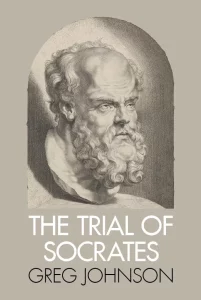The Origins of Western Philosophy: Diogenes Laertius

A seventeenth-century engraving of Diogenes Laertius (image courtesy of Wikipedia).
2,377 words
The Milesian philosophers were wrong about everything, but they asked the right questions, and for the first time sought natural explanations instead. — Luke Mueshaller, Pre-Socratics: A Painless Introduction
The limit of all wisdom is in me. — Epigram on Pythagoras, Boundaries, Duris
Although the twilight is darkening around Western philosophy, she is still just visible through the gloom. She had already been demoted from her role as theology’s handmaiden and queen of the sciences to a kind of antiquarian pursuit, like collecting moths in glass-covered frames or old jazz records. Now, if she exists at all, it is either as political activism or as a historical record of the intellectual adventure of the West, one increasingly neglected.
Of course there are non-Western philosophies, but I am not familiar with them, so I use the term “philosophy” to denote Western philosophy only, as most Westerners do. The Confucius I have glanced at seems to be confined to behavior at court, like a gentler version of Machiavelli with nicer tea. I read the phrase “black existentialism” recently and stopped off at Wikipedia to get the flavor. Wikipedia is gushing yet comprehensive with all things dark-skinned, and the page informed me that:
Black existentialism or Africana critical theory is a school of thought that “critiques domination and affirms the empowerment of Black [sic, you all know the score by now] people in the world”.
I am over my initial irritation at the contemporary use of “critique” as a verb, and I was interested to see a summation of the work of a man (one assumes) named Lewis Gordon, who “argues that Black existentialism is not only existential philosophy produced by Black philosophers but is also thought that addresses the intersection of problems of existence in Black contexts.” Any white person who has visited a shopping mall or taken a stroll down Martin Luther King Boulevard knows all about “problems of existence in Black contexts.”
As for Buddhist koans and suchlike, they are far too easy for hippies to like, and often wear a mask of profundity to disguise childish frivolity. If anyone ever asks you “What is the sound of one hand clapping?”, do yourself and everyone else a favor and answer by slapping their face. So, I confine myself to Western philosophy, which is both the most successful in world history, and — the Berber St. Augustine notwithstanding — exclusively white. If it’s all right with everyone, when it comes to philosophy we’ll stick with the white stuff.
Like all disciplines, philosophy has a timeline, and Diogenes Laertius’ Lives and Opinions of the Eminent Philosophers (Lives) has a curious place in that history. Not a great deal is known about Diogenes the man, who lived circa 180 to 240, and so between Sextus Empiricus and the neo-Platonists. His famous quip to Alexander the Great when asked what the mighty ruler could do for him is one of philosophy’s rare moments of humor: “Stand a little out of my sunshine.” His Lives is a collection of brief and anecdotal accounts of the lives, sayings, and works of the various Greek philosophers known as the pre-Socratics, as well as Socrates himself, Plato, and Aristotle. As a work of philosophy, it may be sketchy and incomplete, but as a portal to the founding fathers of Western philosophy, it is a treasure rescued from the iniquities of history.

You can buy Greg Johnson’s The Trial of Socrates here.
The greatest potential link we might have had to the Classical world was severed by the destruction of the great library at Alexandria, which burned down in 48 BC when Julius Caesar’s troops set fire to Ptolemy’s fleet in the harbor and the conflagration spread to the city. So, as imperfect and sporadic as the Lives may be, it is a precious consolation which preserves fragments of a philosophical world otherwise mostly lost to us. It has received, over the years, rather harsh treatment at the hands and pens of historians of philosophy, but as an introduction to Classical thought it is a primer of which I am very fond and would recommend to anyone new to the territory.
If you are a philosopher or a student of philosophy, you will know all about The Oxford Companion to Philosophy. If you are interested in the subject, and see a copy in a thrift store or secondhand bookshop, snap it up (it’s quite pricey on Amazon) and it will be money spent — as well as the sixth-century BC philosopher Thales of Miletus did when he bought up most of the local olive presses long before the harvest. He made a fortune — not because of the rich harvest (which he had foreseen by reading nature’s signs), but because there weren’t any presses left in town, Thales having cornered the market. This is the same Thales who was ridiculed by an old woman for falling into a well while walking and looking up at the stars, thereby providing an ageless metaphor for the inability of some intellectuals to process the world’s harsh realities.
The only problem with the Oxford Companion is that a lot of the entries are written by rather sniffy Englishmen, and the entry on Diogenes Laertius is no exception, as R. J. Hawkins, late of Keble College, Oxford, finds the Lives to be:
. . . an uncritical scissors-and-paste work [in which] his accounts are unreliable, and sometimes incoherent. He had a taste for anecdote and paradox, but no talent for philosophical exposition [and] it is hard to detect any distinct philosophical position of his own.
Hardly the greatest blurb for a book cover, but the ramshackle, gossipy tone of the Lives is a great part of its appeal, particularly for a reader coming to Classical philosophy for the first time. As for the lack of a “distinct philosophical position,” I am baffled as to why that counts against the work. Is a book about philosophers required to be a book of philosophy rather than just a history? A lack of philosophical opinion in the Lives did not bother Montaigne, who wished that there had been a dozen Diogenes instead of just one, but Nietzsche, a great reader of Montaigne, judged him more harshly as “dim-witted.” It is Diogenes’ philosophical small talk that provides the charm of the Lives.

You can buy Greg Johnson’s From Plato to Postmodernism here
Diogenes helpfully informs us of any other contemporaneous individuals bearing the same name as his subjects — there were several other Aristotles, for example — as well as being fascinated by the details of various philosophers’ wills, in the testamentary rather than the philosophical sense. He is also roundly mocked by critics for the poetic epigrams he devotes to various figures from the past.
Even those entirely unfamiliar with philosophy will know the name of Socrates, and Diogenes tells us that the inquisitor of the agora was physically in excellent shape, tending to his body as much as his mind. It is a pleasing thought that Socrates went to the gymnasium not just to question passersby about the nature of virtue or courage, but also for a bit of bench-pressing and a few dozen bicep curls. Western philosophy is generally agreed to begin in earnest with Socrates and his amanuensis Plato, followed by Plato’s brilliant student Aristotle. Philosophy’s internal dynamic for 2,000 years was funded by their differing concerns, and Raphael’s painting The School of Athens shows this schism visually, the elderly Plato pointing his finger to the heavens while his student flattens his palm downwards toward the earth. This instituting opposition would form the core of philosophical thought until the Renaissance, and many attempts were made to fuse these apparently irreconcilable worldviews, perhaps most famously by “the angelic doctor,” St. Thomas Aquinas. Both Plato and Aristotle are covered by Diogenes, and sprinkled with anecdote, textual fragment, and hearsay.
Philosophy was always proto-scientific, a sort of warm-up act for the triumph of the Enlightenment and the industrial revolutions of the eighteenth century. This period saw a schism within philosophy with, as it were, its scientific wing taking philosophical methodology that had been honed over centuries and leaving theology’s handmaiden with an assortment of things science had no real use for, mainly metaphysics and morals. Philosophy resembles a worker laid off but forced to train her replacement before she leaves. Pre-Socratic philosophy, although simplistic and hardly scientific in our modern sense, is nevertheless the source of the modern scientific worldview. It stands as a transition point between the Homeric mental landscape of the Greeks and the investigative course philosophy would take. For the Homeric Greek, lightning was a visible display of the Zeus’ anger (and reputedly killed Orpheus), while for Anaxagoras the phenomenon was caused by “the rubbing together of the clouds.” There is also a whisper of Kant’s transcendentalism in Anaxagoras’ belief that “[a]ll things were mixed up together; then Mind came and arranged them all in distinct order.”
Thales, he of the wine presses and mishap with the well, is usually credited along with Pythagoras as being the first philosopher proper, and he was certainly the first animist. Aristotle, and thus Diogenes, quotes Thales’ maxim that “all things are full of gods,” thus endowing the inorganic world with an internal, animating spirit. This is the seed from which the concept of the soul would grow, and is a good example of pre-Socratic thought as itself an animating principle of much of what was to follow, particularly in the religious realm.

You can buy Mark Gullick’s novel Cherub Valley here.
Many of Diogenes’ reported quips and maxims are plays on the Greek language and not often translatable, but many are simple witticisms. To see this as lightweight frippery misses a trick. The use of language to create conundrums, puns, and metaphors is just as much a part of philosophizing as the weightiest tome. When Aristippus, a pupil of Socrates, was informed by his mistress that she was pregnant by him, he drily remarked that “You can no more tell that, than you could tell, after you had gone through a thicket, which thorn had scratched you.”
There is philosophical substance here, however, despite the dismissiveness of Diogenes’ later critics, and the formative divisions and categories of the subject which would dominate philosophy for centuries are laid out in the original form of their inception. The pre-Socratic philosophers were coming to the understanding of the world fresh, with little tradition but hearsay of their own and the grand backdrop of Homer. Even in the lumber room of Diogenes it is possible to see philosophy hiving off from everyday discourse, the examination of the world becoming a distinct province with its own satraps and governors. Many of the names Diogenes covers wrote a great number of volumes (or scrolls, I suppose), and it seemed to be a part of the gentrified Greek’s life to give his opinion on numerous subjects. Most of these are, of course, lost, and it is a pity I will never get to read Theophrastus’ tract on the intellect and moral character of animals. The same writer does provide, on his deathbed like Socrates in the Phaedo, a very serviceable if conditional endorsement of philosophy to his friends:
But may you all be fortunate, and either abandon philosophy (for it is a great labour), or else cling to it diligently, for then the credit of it is great; but the vanities of life exceed the advantage of it.
The West can hardly be said to have clung diligently to philosophy, and perhaps that is a contributing factor to its current intellectual malaise. Certainly we are a long way from Plato’s celebrated requirement in the Republic that societies are best ruled not by philosophers or kings, but by an amalgam of both.
If philosophy has any political home today in the West, it can only be on the Right. Leftist dogma is blooming like bacilli on a Petri dish and has thoroughly infected the universities, and the new Left are staunchly anti-philosophy for two reasons. Firstly, philosophy is a white project, and this is enough to disqualify its entire history. David Hume, the great Scottish philosopher and polymath, wrote in an essay of 1748 entitled “Of National Characters” that “I am apt to suspect the Negroes to be naturally inferior to the whites,” which led to a predictable outcry despite being as accurate as anything he ever wrote. But, instead of reading Hume’s stylistically brilliant and philosophically groundbreaking work and offering a reasoned critique, it was far easier for Edinburgh University to register its opposition to racism (and thus placate its students) by renaming its David Hume Tower. Secondly, even those who discount philosophy as racially outmoded and irrelevant in today’s technological world would struggle to make a case that it is intellectually negligible, and this automatically excludes those who now set the cultural agenda. In short, the Left are glad to reject philosophy for childish reasons because some of it is very hard to understand. You have to work at philosophy; you can’t have it spoon-fed to you like critical race theory.
The Classical world deserves our attention if only because Donna Zuckerberg, Mark’s unappetizing sister, claims it is the province of “the worst men on the Internet.” With that kind of billing, you can count me in. But, as the musings of the early Greek philosophers showed, philosophy is not, nor should it be, primarily concerned with definitive answers, but rather the ability to frame meaningful questions. This is something Martin Heidegger –himself a great exponent of the pre-Socratics — understood, and is nowhere more lacking than in our declining West, run as it is technocratically and managerially and obsessed as it will remain with “solutions.” Solutions, as it were, are not always the answer.
Diogenes Laertius is a curiosity in philosophy’s history, but an enjoyable one. The Lives does not need to be read through straight, but can be dipped into to provide the taste of a Greek experience for which philosophy was fresh and new, and the world with it. Now, in our jaded and intellectually undernourished age, The Lives and Opinions of the Eminent Philosophers is worth more than the lives and opinions of those currently crafting our decline. In a barbaric age, it is a pleasure to observe with Diogenes that “thus did philosophy arise among the Greeks, and indeed its very name shows that it has no connection with the barbarians.”



